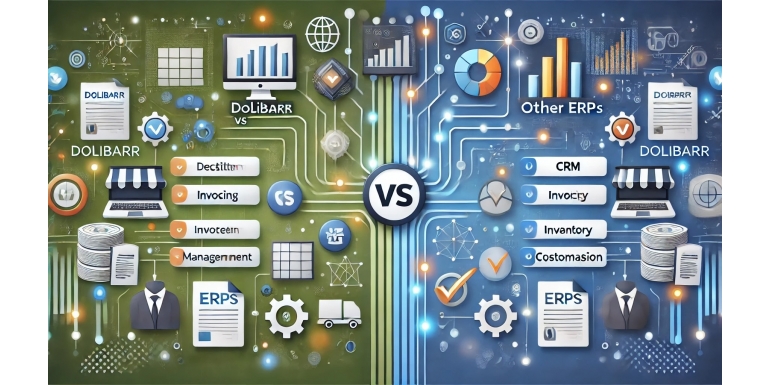
Introduction
An ERP (Enterprise Resource Planning) system is an essential tool for businesses looking to centralize and automate resource management. Among the many solutions available on the market, Dolibarr stands out for its accessibility, flexibility, and open-source model. But how does it compare to other ERPs like SAP, Odoo, or Microsoft Dynamics?
In this article, we will compare Dolibarr with other ERPs by analyzing features, costs, ease of use, and competitive advantages.
1. Overview of Dolibarr
1.1. What is Dolibarr?
Dolibarr is an open-source ERP and CRM designed for small businesses, SMEs, and freelancers. It allows businesses to manage various aspects of their operations:
-
Commercial management (quotes, invoices, orders, clients, suppliers)
-
Accounting and payment tracking
-
Inventory and logistics management
-
Project management and human resources
-
CRM (Customer Relationship Management)
Its main advantage lies in its modularity: each business can activate only the features they need.
1.2. Strengths of Dolibarr
-
Open-source and free (with the option to add paid modules)
-
Intuitive and ergonomic interface
-
Customizable and extendable via modules
-
Active community and accessible support
-
Easy and quick installation
2. Comparison of Dolibarr vs. Other ERPs
We will compare Dolibarr with three popular ERPs: Odoo, SAP Business One, and Microsoft Dynamics 365.
2.1. Ease of Installation and User Experience
| ERP | Installation Difficulty | Learning Curve |
|---|---|---|
| Dolibarr | Very easy | Easy to use |
| Odoo | Moderately complex | Modern interface but can be complex |
| SAP Business One | Heavy installation | Requires extensive training |
| Microsoft Dynamics 365 | Long and technical process | More intuitive interface but complex |
Dolibarr stands out for its quick installation and intuitive interface, unlike SAP and Microsoft Dynamics, which often require technical support.
2.2. Features
| Feature | Dolibarr | Odoo | SAP Business One | Microsoft Dynamics 365 |
| Commercial management | ✅ | ✅ | ✅ | ✅ |
| CRM | ✅ | ✅ | ✅ | ✅ |
| Inventory management | ✅ | ✅ | ✅ | ✅ |
| Accounting | ✅ | ✅ | ✅ | ✅ |
| E-commerce integration | ✅ (via modules) | ✅ | ❌ | ✅ |
| Process automation | ✅ (advanced modules) | ✅ | ✅ | ✅ |
| Customization | ✅ (modular) | ✅ (third-party modules) | ⚠️ (less flexible) | ✅ |
Dolibarr covers essential ERP functionalities but may require additional modules for advanced features like process automation.
2.3. Cost and Business Model
| ERP | Licensing | Implementation Cost | Maintenance Cost |
| Dolibarr | Free (open-source) | Low (hosting and modules) | Low (community support) |
| Odoo | Open-source, but paid modules | High | Monthly fee based on the number of modules |
| SAP Business One | Paid license | Very high | Expensive maintenance |
| Microsoft Dynamics 365 | Paid license | High | Expensive monthly subscription |
Dolibarr is the most cost-effective solution, ideal for small businesses and startups with limited budgets.
2.4. Support and Community
| ERP | Open-Source Community | Technical Support | Documentation |
| Dolibarr | ✅ (very active) | Paid support available | Comprehensive |
| Odoo | ✅ (active) | Paid support | Good documentation |
| SAP Business One | ❌ | Official support only | Average |
| Microsoft Dynamics 365 | ❌ | Official support only | Good documentation |
Dolibarr benefits from a strong community that regularly provides updates and improvements, unlike proprietary ERPs, where support is exclusively paid.
3. Advantages and Disadvantages of Dolibarr
3.1. Advantages
✅ Easy installation and use ✅ Free and customizable ✅ Modular: activate only the necessary features ✅ Active community and many available extensions ✅ Suitable for small and medium businesses
3.2. Disadvantages
⚠️ Limited advanced functionalities without additional modules ⚠️ Less suited for large enterprises with highly specific needs ⚠️ Technical support mainly community-based (although paid options exist)
4. Who is Dolibarr best suited for?
Dolibarr is particularly suitable for:
-
SMEs and small businesses looking for an affordable and quickly deployable solution
-
Startups needing a scalable ERP
-
Freelancers who want an all-in-one business management tool
-
Companies seeking a flexible and customizable ERP
However, for large enterprises with very specific needs, an ERP like SAP Business One or Microsoft Dynamics 365 may be more suitable.
Conclusion
Dolibarr stands out as a flexible, intuitive, and cost-effective ERP solution, ideal for small and medium-sized businesses. Compared to solutions like Odoo, SAP, and Microsoft Dynamics, it offers an accessible and scalable open-source alternative.
If you are looking for an efficient, customizable, and low-cost ERP, Dolibarr is an excellent choice. However, for advanced needs, additional modules may be required, or a more robust solution may be necessary.
In any case, it is essential to evaluate your needs before choosing an ERP to ensure you select the most suitable solution for your business.
